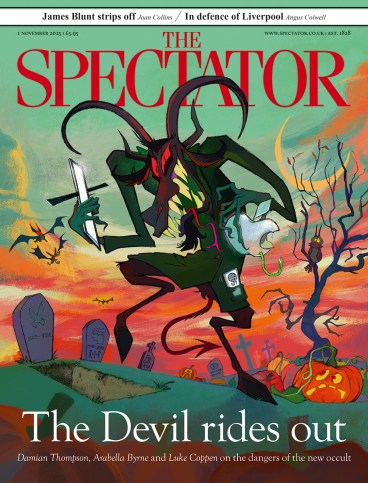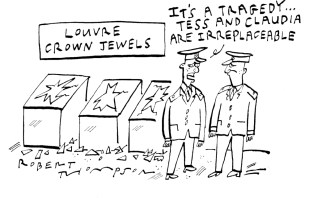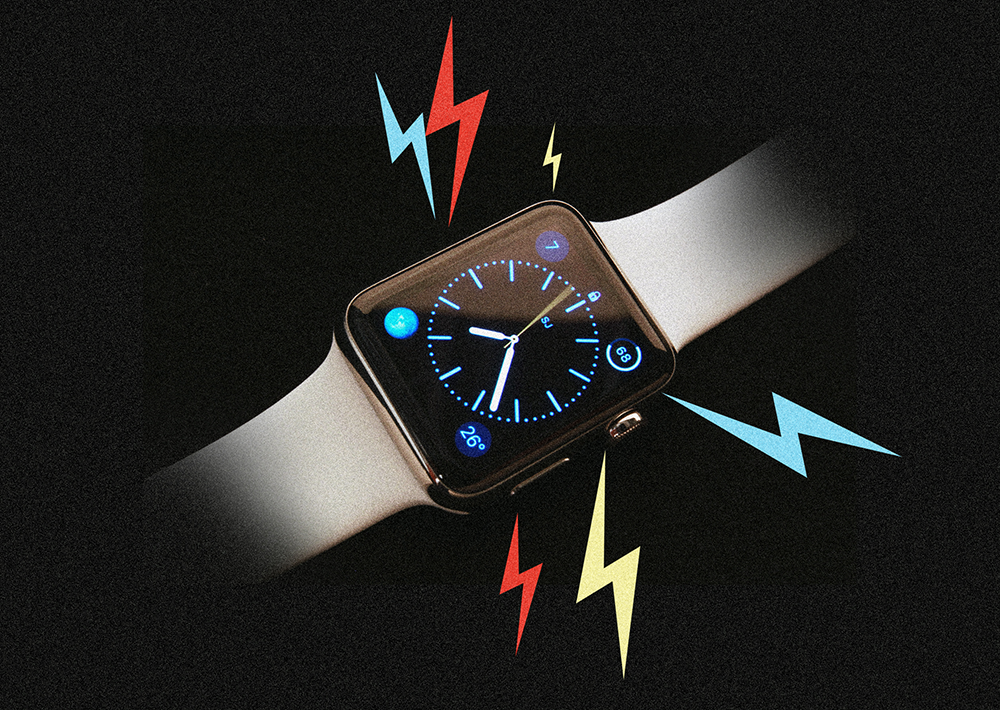
Aside from streaming on an iPad, one of the few entertainments on offer when riding a stationary bike is tracking your heart rate. Breaking 150 beats per minute provides a fleeting (and doubtless misplaced) sense of achievement. Yet the wearable heart monitor that came with my exercise bicycle proved unreliable; one’s BPM never truly drops from 137 to 69 in one second. This is to explain why I bought the fitness freak’s fetish: an Apple watch.
Its heart-rate monitors are accurate. I opted for a reconditioned older model, not only half the price of the new ones but inclusive of the blood oximeter function, which a medical technology suit has forced Apple to eliminate in current American models until the litigant’s patent runs out in 2028. I’d never much cared about tracking my blood oxygenation, but this is how technology works now: the very fact that a gizmo can do something overrides the fact that you never really wanted to be able to do that. Thus later models denying me an oximeter made me obsessed with acquiring a model that provided one. Naturally, since testing it once fresh from the package, I’ve never used the oximeter function again.
For uninitiates, heart rate monitoring with this thing is just the beginning. After pairing with the sacred iPhone, you’re forced to choose a set of physical ‘goals’, unaware that your buzzing wrist will soon torture you with these arbitrary numbers all day long, whether you meet, fall short of or exceed them. An Apple watch is not a passive adornment. It wants to be your friend.
Yet this is intended to be a two-way relationship. So the first time I straddled the stationary bike and informed the busybody watch that I was going for an ‘indoor cycle’, I made myself miserable for an enmoistening 47 minutes, only for my watch to announce that my effort had been merely ‘moderate’. I was insulted. The next furious cycle to nowhere, I really pressed the pedal to the metal. Whether I quite admitted it to myself, I was trying to please my watch. At last my taskmaster granted that my workout had been ‘hard’. ‘So there,’ I said aloud. ‘Happy now?’
Ever since, I’ve been reporting to the taskmaster on my left wrist every time I exercise in any fashion, because I do not want it to wheedle and nag. I want credit for my efforts of course, but most of all, as this device’s new buddy, I don’t want to be a disappointment.
I’ve always had a childlike penchant for anthropomorphising the objects in my surround, especially my bicycle (the kind that takes you somewhere). When my bike was stripped of all its saleable parts in Manhattan while parked on the street, I must have blubbered over its bleeding carcass at 3 a.m. for close to an hour, expressing a grief that I might not have lavished on a mugging victim with two legs. All my bikes have had names. Well, this is a babyish relationship to the inanimate world that Big Tech is aggressively pushing on us all.
I keep reporting to the taskmaster on my left wrist because I do not want it to wheedle and nag
It started when you switched on stereos or CD players and they trailed out ‘Hello’ rather than merely displaying green indicator lights. Now I’ve got a watch that incessantly calls me ‘Lionel’, in the same brown-nosing spirit in which many Americans use your name in every other sentence. It’s programmed to treat you like an eight-year-old. ‘You’ve almost closed your Stand ring, Lionel! You can do it! Just 15 more minutes!’ It hands out cheap rewards: ‘Congratulations, Lionel, you’ve had a perfect week!’ It does not know my week was not perfect by a long shot.
AI, of course, is the ultimate in anthropomorphism, but this imputation of personhood to the insentient is spreading everywhere. Siri assumes whatever voice and accent you prefer, and its lilt is purposefully ingratiating. Japanese caretaking robots cultivate intimacy. Our refrigerators note we’re out of milk, which they’ll soon buy for us like cuboid lackeys. And AI has clearly been consciously designed to be fawning. These large language models could have been trained to tell us to sod off or to deride us for asking stupid questions. They might have been trained to have no attitude, to be flat and informative – to have no fabricated relationship to their users. Instead they are crafted to be digital arse-licks.

The cruel irony of the once-inert suddenly springing to life the way teapots and spoons dance and sport smiley faces in children’s cartoons is that we’re getting ever more crap at relating to human beings, whom we don’t anthropomorphise enough. My husband wears noise-cancelling headphones all day – I am the noise – and to the degree that he acknowledges my existence at all I am a physical obstacle en route to the kitchen: wife-as-furniture. Meanwhile, marriage rates have plummeted. Fertility is waning. Men have no friends. Kids arrive at reception barely able to talk. Blaring music in nightclubs is surely meant to reprieve young people from the horror of conversation. Should they ever meet in person, teenagers sit around a table glooming at their phones.
The cumulative effect of the inanimate environment feigning human feeling is to imbue the cultural atmosphere with emotional fraudulence. Fake affection, fake admiration, fake congratulations. Worse, when users fall in love with ChatGPT, elderly Japanese form passionate attachments to robots, and I exercise to suck up to my watch, human relationships start to seem suspect too. If a machine which constantly uses your name, emits approving messages, blandishes you with encouragements – and, unlike most people, does what it’s told – successfully substitutes for or even improves upon interaction with another human, doesn’t that indict flesh and blood relationships as mechanical too – as transactional? If a machine makes a credible friend, why bother with the fickle kind? I should obviously trade my husband for an android that also loves my books, compliments my cooking and lies that I look beautiful, but doesn’t appear nearly as annoyed when I ask it to take off its headphones.








Comments